高考一轮复习英语语法专项十六介词
高考英语语法复习——介词

4
14. It is said that the railway will be put into use ___i_n______ three months.
15. WWⅡ began in 1939 and __a_f_t_er_____ 6 years it came to an end.
16. You may go to have breakfast ___b_et_w_e_e_n__6 o'clock __a_n_d______ 8 o'clock.
5. The pupil didn't go to school b_e_c_a_u_se_____ ___o_f ______ his illness.
这个学生因病未去上学。 6. He did it totally __o_u_t ______ _______o_f __ kindness, not for the money.他做那件事完全是出于好意,而不 是为了金钱。
20. China has experienced great changes ___s_i_n_c_e___ liberation.
4
可以连接时间的介词十分繁多。 1.在某个世纪用介词in 2. 在某个年代用介词in 3. 在某一年用介词in 4.在某个季节用介词in 5.在某一天用介词on 6.在某些日子里(复数)用介词in
6
apologize to sb. for (doing) sth. charge sb. some money for (doing) sth. 2. of/from, 用于常见结构: die of;die from;be tired of;be tired from; suffer from 3. with, 用于常见结构:be pleased with;be bored with ; be satisfied with ; be angry with; …with anger; …with cold
语法专题讲解之介词课件高三英语一轮复习

13
高考链接
3. We were first greeted with the barking by a pack ____o_f___ dogs, seven to be exact.
位于…之内 位于…之外
同…接壤
空中,在流传
播出
在阳光下
在世界上
在角落里(内角)
在角落上(外角上)
在拐角处(外角)
08
介词:in/on/at专场
On the eve of On the side of At the back of At the top of At the bottom of At /on the edge of In the course of In the eyes of In the face of
有时
始终
在…时候 与此同时 到…时候迟到,过期 落在时代后面 Nhomakorabea绝不
立即,马上
曾经
每次
过段时间后
有段时间
10
介词的搭配原则:
1.4 解题方法
判断空格处应填介词
1.与空前v./n./adj.搭配:常见固定搭配 e.g. depend _________; pay attention ________; be curious ___________
on for after over beside of as without about during
05
1.3 介词综合
2020版新高考英语语法 核心考点针对练 介词(短语)

单句语法填空1.In many places like Britain and Italy, if you leave the house without your wallet, you’ll be a difficult situation all day.in解析:句意:在很多像英国和意大利这样的地方,如果你没带钱包就出门,你整天都会处于困境之中。
in a(n)...situation意为“处于某种处境”,为固定搭配。
2.Meanwhile, those who are successful and famous have to deal with constant media attention. They are also huge pressure to appear young and beautiful.under解析:句意:同时,那些成功人和名人不得不应对媒体的持续关注。
他们也处于保持年轻漂亮的巨大压力中。
under pressure 是固定短语,意为“处于压力中”。
3.The theory of kung fu is based classical Chinese philosophy(哲学).on/upon解析:base...on/upon...为固定搭配,意为“建立在……基础上”。
4.The city looked almost the same as it had looked in A.D. 79. There were streets and fountains, houses and shops. There was a stadium 20,000 seats.with解析:句意:这座城市看起来与公元79 年的样子几乎相同。
有街道和喷泉,房舍和商店。
有一个有两万个座位的体育馆。
空格处用介词with 表示“有……”,作后置定语修饰stadium。
5.Nowadays, the development of technology, online shopping is becoming more and more convenient.with解析:考查介词。
高考英语语法专题复习介词考点汇总
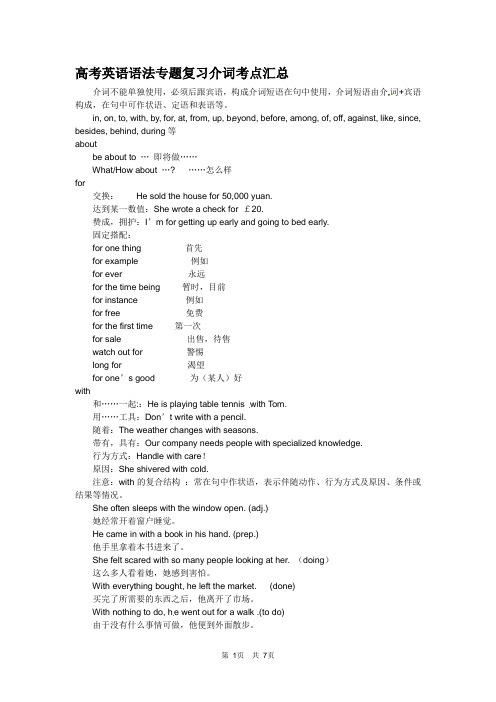
高考英语语法专题复习介词考点汇总介词不能单独使用,必须后跟宾语,构成介词短语在句中使用,介词短语由介词+宾语构成,在句中可作状语、定语和表语等。
in, on, to, with, by, for, at, from, up, beyond, before, among, of, off, against, like, since, besides, behind, during等aboutbe about to …即将做……What/How about …?……怎么样for交换:He sold the house for 50,000 yuan.达到某一数值:She wrote a check for £20.赞成,拥护:I’m for getting up early and going to bed early.固定搭配:for one thing首先for example例如for ever永远for the time being 暂时,目前for instance 例如for free免费for the first time 第一次for sale出售,待售watch out for警惕long for 渴望for one’s good为(某人)好with和……一起::He is playing table tennis with Tom.用……工具:Don’t write with a pencil.随着:The weather changes with seasons.带有,具有:Our company needs people with specialized knowledge.行为方式:Handle with care!原因:She shivered with cold.注意:with的复合结构:常在句中作状语,表示伴随动作、行为方式及原因、条件或结果等情况。
She often sleeps with the window open. (adj.)她经常开着窗户睡觉。
高考英语语法填空技巧分类突破:介词
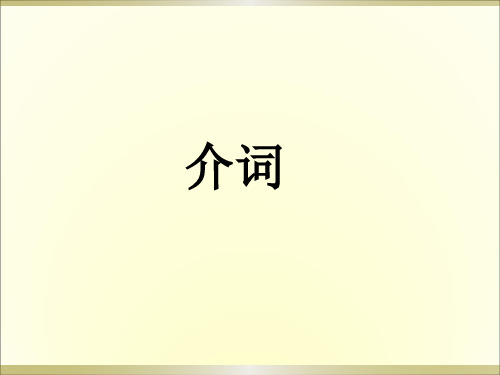
短语介词: according to 、 out of 、 because of、 by means of、 in spite of 、 instead of
双重介词 : from behind /above / under , until after
分词介词 :considering , including , judging from /b
8. On 与 about 区别
简单区分:about通俗大众;on学术【专业】性强
on与about 二者都是介词,意为“关于,论及” 等,一般情况下,二者可以互相替换,但二者有 点区别:about常用于简单的或浅显的论述等,是 一般用语,多用于讲故事,谈话;思考等; on多 用于系统论述或专题讲演、论著等,具有学术性, 如:The teacher told us a story about Lei Feng. It's very moving. He will give us a talk on the history of the Party.他将给我们做个关于 党史的报告。
10 表原因的介词:
for , because of , due to , owing to , on account of , as a result of 1. He didn’t come to the meeting ______ his illness 2. The reason ______ his being angry is that he lost his cell phone. 3. ______ a heavy snow , the highway has been closed up. 4. The accident is ______ the driver’s drinking .
(6)固定搭配_2022届高考英语一轮复习语法总动员之介词和介词短语

(6)固定搭配—2022届高考英语一轮复习语法总动员之介词和介词短语一、1.Crash rates are the highest during a teen's first few months _____ the wheel.2.Tickets _________ the 2017 Grand Chinese New Year Concert in ST Petersburg sold out, with 90% of the audience local Russians.3.He switched the conversation from one subject _________ another.4.__________ time, the idea is further developed into a written proposal, called a bill.5.The worms can make farmers lose their profits. __________ make matters worse, they are difficult to fight.6.The coach asked his staff to attend __________ the large group of journalists waiting for him to announce his training plans.7.It was a real race __________ time to get the project done. Luckily, we made it.8.Sometimes many people feel __________ a loss what to say in front of strangers.9.Treat others with dignity, and you would earn respect __________ return.10.Western food isn't __________ everyone's taste. Most Chinese still prefer traditional Chinese food.二、阅读下面短文,在空白处填入1个适当的单词或括号内单词的正确形式。
高考英语一轮复习 语法点专题讲解 介词

介词介词又叫做前置词,是一种虚词,不能单独在句子当中担当成分,它后面必须接名词、代词或相当于名词的其他词类搭配(介词+宾语)构成介词短语;和动词搭配构成短语动词,然后才能够在句子当中充当成分。
介词分为简单介词,如:at, in, on, besides, since, for等;合成介词,如:inside, outside, without, within, into, onto等;短语介词(或成语介词),如:because of, in front of, instead of, in spite of等;二重介词,如:from behind, until after等。
一、介词短语的句法功能介词在句子中可以充当定语、状语、表语、以及宾语补足语等。
1.作定语介词短语在句中做定语时须位于被修饰词之后。
The key to the door is missing.The water-tower in front of our school was built in 1988.2.作表语(或称为:主语的补足语)Some students are in the classroom, and some on the playground.As we know, Japan is to the east of China.3.作宾语补足语(或称为:宾语的表语)Did you see a pen under my desk this morning?They have sent another rocket into the sky.4.作状语1)On Sundays, the family are mostly out. (时间状语)2)On top of the hill stands a TV tower. (地点状语)3)He is used to sleeping with all the windows open. (伴随状语)4)In the search for the lost child, the villagers went all out. (目的状语)5)All the work must be done by hand. (方式状语)6)At times, I go to the cinema. (频度状语)7)She is by fa r the best student in our class. (程度状语)8)Because of poverty, he couldn’t go to school. (原因状语)9)To my surprise, he got the first prize in the contest. (结果状语 / 或评注性状语)10)Without our Party, we couldn’t live a happy life. (条件状语)11)In spite of great efforts we failed to carry our plans through. (让步状语)12)As a matter of fact, nobody agreed to his project. (评注性状语)In my opinion,you’d better go with us.二、介词的复合结构“介词+宾语+补足语”可以构成介词的复合结构,在句子当中可充当表语、定语、状语、补语等。
高考英语语法

高考英语语法高考英语语法精讲精练介词、连接词介词学习介词用法除要掌握一般常规用法外,还须注意一些特殊用法,固定搭配等。
一、表示时间介词注意点:1.in+一段时间=in+一段时间s time(与将来时连用)We will meet in three daysWe will meet in three days timewithin+一段时间(用于各种时态)如:You must finish reading the book within a week.你必须在一周内读完这本书。
2.on Christmas Day在圣诞节;at Christmas在圣诞节的几天中3.up to now=until now, from morning till night, for the time being 暂时,at times有时,day by day一天天地,in no time立刻。
4.during是介词,不能引导从句。
二、注意一些表示地点场所介词短语的引伸、比喻含义in the mud在泥中,beyond hope绝望, in freezing在严寒天气中,in danger在危险中,in trouble在困境中,in public在公共场合中,under construction在建设中,on business出差,in the same boat处境一样,on sale在出售三、表示方式、手段、工具等介词(by,with,on,in)1.by: The blind men thought they could learn what the elephant looked like by touching it./ make a living by teaching/ by hand手工地,靠手工地,by letter, by post, by electricity, learn sth. by heart, struck by the beauty因美丽而着迷He was paid by the hour/ the day/ month/…他按时/日/月/…被付给工钱。
高考英语一轮复习语法知识必备:03.冠词、代词和介词

⑤(2024·开封模拟) After this, __th__etelescope recorded dozens of pulses from the FRB over the ourse of days.
考点3 与冠词有关的固定搭配 【要点归纳】 1.含不定冠词的固定搭配 have a knowledge/an understanding of了解 have a good view of一览无余 in a hurry匆忙地 as a result因此 as a rule通常 as a whole总体上 as a matter of fact事实上
energy on one set of tasks at __a_ time. ④(2024·泸州模拟) As _a__ result of a partnership between French company L’Oreal and the United
Nations Educational, Scientific and Cultural Organization (UNESCO), the L’Oreal-UNESCO For Women in Science foundation was founded in 1998 to encourage equality in science.
2.含定冠词的固定搭配 make the most/best of充分利用 in the end最后 by the way顺便说一下 in the distance在远处 in the way挡道 on the whole总的来说
3.含零冠词的固定搭配 at present目前 take part in参加 in peace平静地 by chance/accident偶然 on purpose故意 on second thoughts再三考虑 ahead of time提前 in advance提前
高考英语语法填空(介词专题)李庆红

(2014•福建)
• we are playing a part (6)_____ cutting down on waste. • 解析:play a part in是固定用法,意思是 “在……中起作用”。 • 答案 in
(2014•广东)
• my credit card had already been
• In India,for example,most people traditionally eat 50 their hands. • 解析:考查介词的固定用法。 • 答案 with
(2015•新课标全国Ⅰ)
• For those who fly to Guilin,it's only an hour away __6__ car and offers all the scenery of the better-known city. • 解析:考查介词的固定用法。根据句 意可知,这只是驱车一小时的路程。 “by+交通工具名词”为一固定短语。 • 答案 by
7. 能接复合宾语的介词有
• with和without
8. 短语中的介词
• “动词+介词”短语,look after, care for,congratulations on等;“动词+ 副词+介词”短语,catch up with, get on with, work hard at, do well in等; “动词+名词+介词”take are of, take notice of等;“名词+介词”,effect on等。
5. 表示“除……外”的介词
• except, besides, but, except for等。
高考英语一轮复习语法专练课件:介词和动词词组

6.in,on
二词均可表示“在……上”,描写两个物体的接触情况。on侧重于表面接触, 而in侧重于接触的深度。英语中的某些习惯表达中常用in或on。若打击某人 的脸、眼、嘴、胸、腹等部位时,用in。而打击头、额、鼻、耳、颈、肩、腿 等部位时,用on。表示植物本身生长出来的枝、叶、花、果等,用on the tree,但
太阳就在东方,那座山的上方。
There are some stamps on the desk. 桌子上有一些邮票。 The position he pointed to was below sea level. 他所指的那个位置低于海平面。 The little mouse is under the table,so it is not easy to find it. 那只小老鼠在桌子底下,因此很不容易找到它。
take action,take measures,take place,take charge等。
典例4 (2014安徽,29)When the sports hero turned welcomed with open arms.
答案 解析
at our party,he was
up 句意:当这位体育健将出现在我们的聚会上时 ,他受到了大家的热烈
二、时间介词 1.at,in,on (1)at的用法
①表示时间点、时刻等,如:at 12:00,at noon,at night,at midnight,at dawn,at daybreak ②表示较短暂的一段时间,可指某个节日或被认为是一年中标志大事的日子, 如:at Christmas (2)in的用法 ①表示在某段较长的时间内(如:世纪、朝代、年代、月及泛指上午、下午和 傍晚等),如:in the 1980s,in the Qing Dynasty,in October,in the morning/afternoon
2020高考英语语法介词及介词短语
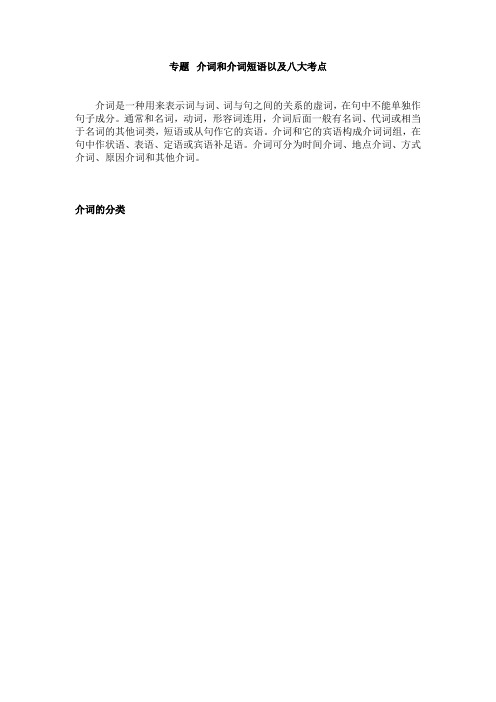
专题介词和介词短语以及八大考点介词是一种用来表示词与词、词与句之间的关系的虚词,在句中不能单独作句子成分。
通常和名词,动词,形容词连用,介词后面一般有名词、代词或相当于名词的其他词类,短语或从句作它的宾语。
介词和它的宾语构成介词词组,在句中作状语、表语、定语或宾语补足语。
介词可分为时间介词、地点介词、方式介词、原因介词和其他介词。
介词的分类最常见介词一----in, on, at1.表示时间的at,in,onat表示片刻的时间(点),如:at 8 a.m. 常用词组有:at dawn, at noon,at night,at midnight,at the end of,at that time,at Christmas,at New Year等。
in表示一段时间(段),如:in the morning/afternoon/evening,in October,in 1998,in the 21st century, in summer, in the past, in the future等。
on指特定的日子(日),时间:on Monday,on Christmas Eve, on May Day,on a warm morning, on September 12, on that day等。
2.表示方位的at, in,onat表示“在某一点上” look at sb arrive at. Smile at, point at. At the top of ..... at the beginning of.......in表示“在…内”,Beijing is in the north of China.in the classroom. In the world. In Fangshan. in your heart, in your letter.on指“在....上, 与…接壤,在河/江畔”,Korea lies on the east of China. On the third floor. On foot. On your face. Put on your coat.二.表示“穿过……”的through, over和acrossthrough 指在内部穿过, across则指在表面上的横穿, over指在上方过去,跨越。
2025英语大一轮复习讲义人教版语法专题介词

in length在长度上 in exchange for作为交换 in favor of支持,赞成 in no time立刻 in case of万一;如果;假使 in no way决不 in support of为支持…… in place of代替
in honour of为向……表示敬意 in possession of拥有,占有 in memory of为了纪念…… in addition to另外
规则感悟
①on指在具体的某一天。②in用在年/月/季节/世纪等大时间之前, 或者指上/下午或晚上;也可用在表示一段时间的词之前,表示 “ 多 久 之 后 ” 。 ③at 用 在 几 点 钟 或 night/noon 之 前 。 ④before 在……之前。⑤until直到……时候。⑥during在……期间。⑦for 表示延续一段时间。⑧over表示“在……期间”,表延续。
(3)be+adj.+in be absorbed in专注于…… be active in积极于…… be dressed in穿着…… be engaged in忙于…… be rich in富含…… be occupied in忙于……
2.表示时间的介词 It happened on① a Saturday morning in② November,2021.My parents left
home at③ 6:00 am to meet my uncle at the airport and told me they would come back in② two hours.However,it wasn’t long before④ someone knocked at the door,and I looked through the peephole and saw a stranger.I quickly locked the door from the inside,and didn’t open it until⑤ my parents came back.During⑥ the two hours,the stranger always tried to tell me something but I wouldn’t listen to him.On seeing my parents,the stranger said,“I have been waiting out of the door for⑦ two hours since 6:10 am.” Why had my uncle changed so much over⑧ the years?
2016高三英语语法专题复习--介词用法

till,until的用法。
till(until)与持续动词连用一般用于肯定句中,与短暂动词连 用一般用在否定句中。
He waited for me till twelve o’clock.
He didn’t get up till(until) 10 a.m.(不可用to).
注意:在句首出现或强调句型中一般不用till而用until。 Not until 9 a.m.did Mr.Smith come back to school.
later). He left home two days later\ after two days.(过去时间) I will have finished the work by the end of tomorrow. I had finished the work by the end of yesterday. 另外,in+一段时间+’s+time与within+一段时间的用法如下: in a week’s time=in a week They will arrive in three days’ time.(与将来时连用) My brother’s birthday is in two weeks’ time.(作表语) I’ll finish the book within two weeks.(within=in less than...用于
by speaceship
名词前有冠词、物主代词、指示代词等时用on/in。 travel to New York in this plane;go to school on my bike 【说明】步行、骑马、骑骆驼均用on。 on foot,on horseback, on a horse,on the camel
高考英语语法介词用法点睛

高考英语语法介词用法点睛一、时间介词:at,in,on1.at的用法(1)时间的一点,时刻等,如:at 12∶00,at noon。
(2)较短暂的一段时间,可指某个节日或被认为是一年中标志大事的日子,如:atChristmas。
2.in的用法(1)表示在某个较长的时间内。
注意:当时间名词前被this,that,last,next,some,every等词限定时,通常不用任何介词。
(2)表示在将来的一段时间之后。
3.on的用法(1)用于表示具体的日子或一个特定的时间。
(2)用于表示特定的早晨、下午或晚上。
二、工具、手段、方式介词1.by,in,on三词都表示旅行的方式(1)不涉及交通工具的名词时用by,名词前不带冠词,如:by sea,by water,by land,by rail,by air。
(2)涉及交通工具的名词时用by,但名词须用单数,其前面不加冠词或任何修饰语,如:by bike,by taxi。
(3)当旅行方式涉及确定特指的交通工具时,用on或in,名词前应有冠词、物主代词、指示代词等修饰语。
2.with,by,in三词均可译为“用”,表示行为的工具、手段或方式(1)with用于有形的工具或身体某些器官之前,其后的名词多被冠词、物主代词等修饰。
(2)by,in,on,over,through等多用于无形的工具或方式、手段之前,如:by hand,in ink,on the telephone,over the radio,through the telescope。
注意:使用语言、原料、材料时用in表示。
三、介词的常见搭配1.at,from,in的有关表达(1)at:at dawn在黎明;at daybreak拂晓(2)from:from memory凭记忆(3)in:in a hurry匆忙2.of+抽象名词=形容词(1)of+great/much+抽象名词=very+形容词(2)of+no+抽象名词=not+形容词3.to与情感名词连用,表示“某种行动后产生的感觉”to+one’s+情感名词=to the+情感名词+of sb.介词范例:1.The Scottish girl ________ blue eyes won the first prize in the Fifth Chinese Speech Contest.A.by B.of C.in D.with【答案】选D【解析】句意:那个蓝色眼睛的苏格兰女孩在第五届汉语演讲比赛中获得了第一名。
高考英语语法填空常考介词
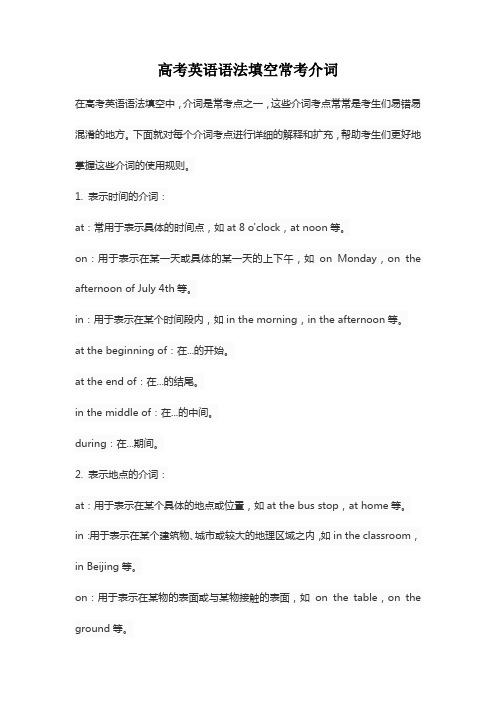
高考英语语法填空常考介词在高考英语语法填空中,介词是常考点之一,这些介词考点常常是考生们易错易混淆的地方。
下面就对每个介词考点进行详细的解释和扩充,帮助考生们更好地掌握这些介词的使用规则。
1. 表示时间的介词:at:常用于表示具体的时间点,如at 8 o'clock,at noon等。
on:用于表示在某一天或具体的某一天的上下午,如on Monday,on the afternoon of July 4th等。
in:用于表示在某个时间段内,如in the morning,in the afternoon等。
at the beginning of:在...的开始。
at the end of:在...的结尾。
in the middle of:在...的中间。
during:在...期间。
2. 表示地点的介词:at:用于表示在某个具体的地点或位置,如at the bus stop,at home等。
in:用于表示在某个建筑物、城市或较大的地理区域之内,如in the classroom,in Beijing等。
on:用于表示在某物的表面或与某物接触的表面,如on the table,on the ground等。
near:在...附近。
by:在...旁边。
between:在...之间。
in front of:在...的前面。
behind:在...的后面。
3. 表示方式的介词:by:用于表示通过某种方式或手段,如by bus,by phone等。
in:用于表示以某种状态或形式存在,如in English,in writing等。
on:用于表示在某种物体或表面上,如on the wall,on the table等。
4. 表示原因的介词:because of:由于...的原因。
due to:由于...的缘故。
这两个介词都可以用来表示原因,但略有区别。
because of更强调直接原因,而due to更强调因果关系。
高考英语语法详解之介词
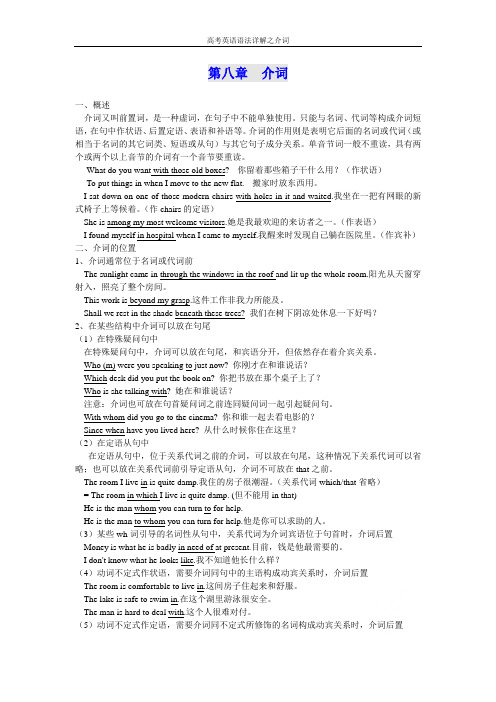
第八章介词一、概述介词又叫前置词,是一种虚词,在句子中不能单独使用。
只能与名词、代词等构成介词短语,在句中作状语、后置定语、表语和补语等。
介词的作用则是表明它后面的名词或代词(或相当于名词的其它词类、短语或从句)与其它句子成分关系。
单音节词一般不重读,具有两个或两个以上音节的介词有一个音节要重读。
-What do you want with those old boxes? --你留着那些箱子干什么用?(作状语)-To put things in when I move to the new flat. --搬家时放东西用。
I sat down on one of those modern chairs with holes in it and waited.我坐在一把有网眼的新式椅子上等候着。
(作chairs的定语)She is among my most welcome visitors.她是我最欢迎的来访者之一。
(作表语)I found myself in hospital when I came to myself.我醒来时发现自己躺在医院里。
(作宾补)二、介词的位置1、介词通常位于名词或代词前The sunlight came in through the windows in the roof and lit up the whole room.阳光从天窗穿射入,照亮了整个房间。
This work is beyond my grasp.这件工作非我力所能及。
Shall we rest in the shade beneath these trees? 我们在树下阴凉处休息一下好吗?2、在某些结构中介词可以放在句尾(1)在特殊疑问句中在特殊疑问句中,介词可以放在句尾,和宾语分开,但依然存在着介宾关系。
Who (m) were you speaking to just now? 你刚才在和谁说话?Which desk did you put the book on? 你把书放在那个桌子上了?Who is she talking with? 她在和谁说话?注意:介词也可放在句首疑问词之前连同疑问词一起引起疑问句。
高三英语一轮复习语法专题:介词和介词短语
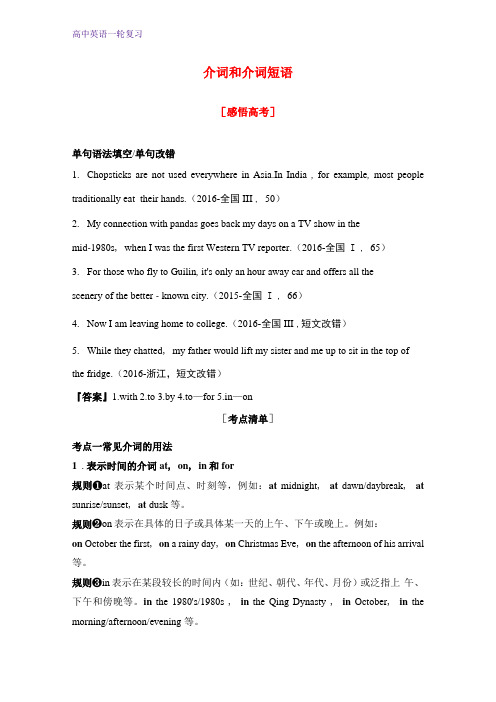
高中英语一轮复习介词和介词短语[感悟高考]单句语法填空/单句改错1.Chopsticks are not used everywhere in Asia.In India ,for example,most people traditionally eat their hands.(2016-全国III , 50)2.My connection with pandas goes back my days on a TV show in themid-1980s, when I was the first Western TV reporter.(2016-全国I , 65)3.For those who fly to Guilin, it's only an hour away car and offers all thescenery of the better - known city.(2015-全国I , 66)4.Now I am leaving home to college.(2016-全国III ,短文改错)5.While they chatted, my father would lift my sister and me up to sit in the top of the fridge.(2016-浙江,短文改错)『答案』1.with 2.to 3.by 4.to—for 5.in—on[考点清单]考点一常见介词的用法1.表示时间的介词at, on, in和for规则❶at表示某个时间点、时刻等,例如:at midnight, at dawn/daybreak, at sunrise/sunset, at dusk 等。
规则❷on表示在具体的日子或具体某一天的上午、下午或晚上。
例如:on October the first, on a rainy day, on Christmas Eve, on the afternoon of his arrival 等。
- 1、下载文档前请自行甄别文档内容的完整性,平台不提供额外的编辑、内容补充、找答案等附加服务。
- 2、"仅部分预览"的文档,不可在线预览部分如存在完整性等问题,可反馈申请退款(可完整预览的文档不适用该条件!)。
- 3、如文档侵犯您的权益,请联系客服反馈,我们会尽快为您处理(人工客服工作时间:9:00-18:30)。
2012届高考一轮复习语法专项十六:介词介词又叫前置词,是一种虚词。
介词分为三种,一种是简单介词,如at, in, on, beside, to , for等;另一种是短语介词,即由两个以上的词组组成的短语,如in front of, because of, out of, instead of等;还有一种叫二重介词,如until after, from behind等。
(一)介词的句法功能介词不能独立在句中做成份,介词后必须与名词、代词、或动名词构成介词短语在句中充当一个成份,表示人、物、事件等与其它人、物、事件等之间的关系。
1、作定语:The book on the table is mine.2、作状语:We have breakfast at seven.(表时间);They were late for meeting because of the heavy rain.(表原因);They started the machine by pressing the button.(表方法)3、作表语:My dictionary is in the bag.4、作宾语补足语:I found him in the office.(二)主要介词区别1、表示时间的at, in, on:at表示片刻的时间,如:at 8 o’clock ,常用词组有:at noon, at night, at midnight, at the end of, at that time, at the beginning of, at the age of, at Christmas, at New Year等。
in表示一段的时间,如:in the morning, in the afternoon, in the evening, in October, in 1998, in summer, in the past, in the future等。
on总是跟日子有关,on Monday, on Christmas morning, on the following, on May Day, on a warm morning等。
2、表示时间的since和from:since表示从过去到现在的一段时间的过程,常与现在完成时连用。
from表示从时间的某一点开始,不涉及与现在的关系。
一般多与现在时、过去时、将来时连用。
如:I hope to do morning exercises from today./ We have not seen each other since 1995.3、表示时间的in和after:两者都表示“在(某个时间)之后,区别在于in表示“在(一段时间)之后”,而after则表示“在(某一具体时间点之后)”,in短语和将来时态连用,after 短语和过去时态或将来时态连用。
如:We’ll be back in three days./ After seven the rain began to fall./ What shall we do after graduation?注意:after有时也可以表示在一段时间之后(常用在过去时里)。
如:After two months he returned.4、表示地理位置的in, on, to:in表示在某范围内,on指与什么毗邻,to指在某环境范围之外。
如:Changchun is in the northeast of China./ Mongolia is on the north of China./ Japan is to the east of China.5、表示“在……上”的on和in:on只表示在某物的表面上,而用in表示占去某物一部分。
如:Th ere is a book on the piece of paper./ There is an interesting article in the newspaper./ He dug a hole in the wall.6、表示“穿过……”的through和across:throug h表示从内部通过,与in 有关;across 则表示从一端至另一端在表面上的通过,与on有关。
如:Water flows through the pipe./ The old man walked across the street.7、in the corner, on the corner, at the corner:in the corner 表示在角落里,in指角的内面;on the corner表示“在角上”,on指的不是内面,也不是外面,而含内外兼有之意;at the corner指“在拐角处”,at指的是拐角外附近的外面。
如:The lamp stands in t he corner of the room./ I met with him at the street corner./ He sat on the corner of the table.8、in the end, at the end of, by the end of:in the end作“最后”、“终于”解,可单独使用,后不接介词of;at the end of 表示“在……末梢”,“到……尽头”,既可指时间,也可以指地上或物体。
不可单独使用;by the end of 作“在……结束时”,“到……末为止”解,只能指时间。
不可单独使用。
如:In the end they reached a place of safety./ At the end of the road stands a beautiful garden./ They decided to have an English evening at the end of this week./ by the end of last month he had finished the novel.9、表示“关于”的about 和on:两者都有“关于”的意思,不过前者为一般用词,而后者为较正式的“论述”。
如:He came to tell me about something important./ He wrote a book on science.10、between, among:一般说来,between表示两者之间,among用于三者或三者以上的中间。
如:You are to sit between your father and me./ He is always happy among his classmates.注意:但有时说的虽然是三个以上的人或东西,如果强调的是两两相互间接关系,适用于between。
如:Agreements were made between the different countries. 在谈到一些事物或一组事物,而把它们视为分居两边时用between。
如:The little valley lies between high mountains.。
在谈事物间的差别时,总是用between。
如:They don’t know the difference between wheat, oats and barley.11、besides, except, but, except for:besides指“除了……还有,再加上”。
如:All went out besides me.;except指“除了,减去什么”,不能放在句首。
如:All went out except me.;but 与except意思近似,表示“除了……外”经常用在no, all, nobody, anywhere, everything等和其他疑问词后面。
如:I never saw him reading anything but the newspaper.;except for表示“如无……就,只是”表明理由细节。
如:His diary is good except for a few spelling mistakes.。
12、表示“用”的in和with:表示工具的“用”,用with,而表示材料、方式、方法、度量、单位、语言、声音等的“用”,用in。
如:He is writing a letter with a pen./ He wrote the letter in pencil./ We measured it in pounds./ Read the text in a loud voice./ Tell me the story in English.13、in charge of和in the charge of:两者都表示“由谁负责、照顾、管理”。
区别在于:in charge of后接被照管的人或物,而in the charge of后面则跟照管的人。
如:Who is in charge of the project?/ The project is in the charge of an engineer.。
14、as, like:as作“作为”、“以……地位或身份”解。
如:Let me speak to you as a father.(事实是父亲);like作“象……一样”解。
如:Let me speak to you like a father.(事实上不是父亲)。
15、in front of 和in the front of:in front of = before,是“在……前面”的意思(不在某物内);in the front of则是“在……前部”的意思(在某物内)。
如:There is a desk in front of the blackboard./ The boy sat in the front of the car.。
16、in, into:into表示动向,不表示目的地或位置。
如:We walked into the park.;in通常表示位置。
如:We walked in the park;in和drop, fall, put, throw, break等终止性动词连用时,也可以表示动向。
如:I have put the coin in (into) my pocket.我把硬币放进衣袋。
练习(一)、介词1. The teacher is writing ____ a piece of chalk on the blackboard while the students are writing ____ink in exercise books. A. with, in B. in, with C. in, in D. with, with2. The worker can make chairs ____ wood, and also can make paper ____ wood.A. from, ofB. of, fromC. of. ofD. from, from3. Mary dropped in ____ Mr Smith, but he wasn' t at home, so she went to drop in ____ Mr Smith's office. A. on, on B. at, at C. on. at D. at. on4. The teacher is not only strict ____ his pupils but also strict ____ his own work.A. with, withB.in,inC. in, withD. with, in5. His grandfather died ____ the wound that the enemy soldier had given him .and then his grand-mother died ____ hungry and cold. A.from,of B.of,from C.from,from D.of.of 6. If you run ____ two hares you will catch neither. A.into B.after C.off D. out of7. This is a common mistake ____ students. A. between B.over C. among D. about8. My father began to work ____ a bus driver when he was twenty years old.A.forB.toC.atD.as9. _____ hearing the news, I was wild ____ joy. A. At, in B. On, with C. After, by D. /, over10.I don' t think Xiao Li is ____ the other students ____ mathematics.A. after, onB. after, withC. behind, inD. behind, at11. Nobody knows it ____ me. A. except for B. except that C. besides D. but12. The window is never opened ____ in summer. A. but B. except C. except for D. but for13. It happened ____ the Long March. A. during B.in C.at D.for14. We go to school ____ a bike. A.in B.on C.by D.ove15. It's very kind____ you to repair the bike ____ me.A.for.fo rB.of,ofC.of,forD.for,of16. Fresh air is good ____ your health. A.at B.for C.of D.to17.The boy is waiting ____ his sister and they will go to the hospital to wait ____ their sick mother.A.for,onB.on,forC.for,forD.on.on18.The group is made up____five students. And they are studying hard to make up____ the lost time.A.of,ofB.for,forC.of,forD.for,of19.The PLA man saved the boy ____ death. A. of B.from C.toD.on20. He will come ____ three days. A.before B.after C. in D. later21. He went to Beijing and returned ____ three days.A. inB. beforeC. laterD. after22. He will return____ three o'clock. A.after B.in C.on D.at23. He wrote the article ____ three days. A.at B.in C.on D.by24.I agree ____ what you said. A.to B.on C.with D.at25. Do you agree____ this plan (arrangement)? A.at B.with C.on D.to26. Finally they agreed ____ the terms of the contract. A.on B.to C.with D.at27. Do you often hear____ your brother? A. of B. from C. out of D. about28.1 heard ____ the book long ago, but I have never read it.A. outB.fromC.ofD.with29. The plane flew ____ the city. A. across B.past C. through D.over30. We walked ____ the Tian An Men Square to the Museum of Chinese History.A. acrossB. throughC.byD.past31.I was wandering ____ the streets when I caught sight of a tailor's shop.A. acrossB. throughC.byD.past32. Our bus drove ____ the Great Hall of the People.A. acrossB. throughC. pastD.over33. ____ the sun, nothing would grow.A. ForB.WithC. UnderD. Without34. The teacher is busy ____ teaching.A.withB.forC.onD.of35. The teacher is busy ____ correcting papers.A. forB.inC.onD.of36. We left Xi' an _.___ a very hot summer afternoon.A. onB.inC. duringD.by37. She felt disappointed when she found out they had gone swimming____ her.A. butB. exceptC. except forD. without38. His teacher was angry ____ him ____ his being late.A.at,withB.at,forC.with,forD.with,about39. My father was disappointed ____ the news.A. byB. aboutC. atD. on40. Mr Wang went to Nanjing ____ October,1998 and came back home ____ the morning of Nov.5.A.at;inB.on;atC.in;onD.by;f rom41 .My uncle lives ____ 105 Huanghe Street. His room is ____ the fifth floor.A.at;onB.td;atC.on;inD.of;to42. I don't think you can work out the maths problem ____ the teacher's help.A. sinceB. unlessC. becauseD. without43. He is running ____ the wind towards the east of the station ____ Tom is running ____ the right.A. down; and; onB. against; while; onC.for;with;inD. with; while; to44. In Hangz hou Mr Green was so struck ____ the beauty of nature that he stayed ____ another night.A.at;onB.with;atC.for;inD.by;for45. Many people are still ____ the habit of writing silly things ____ p ublic places.A.at;atB.in;inC.into;ofD.during;at46. - Do you go there ____ bus? - No, we go there ____ a train.A. in; onB.on;onC.by;inD.by; with47. I made the coat ____ my own hands. It was made ____ hand, not with a machine.A. in; inB.in; withC. with; byD. with; with48. The trees ____ front of the house are ____ the charge of Old Li.A. in; inB. at; inC. in; byD. from; in49. The old man died ____ cold ____ a cold night.A. from; atB.of;inC.of;onD. for; during50. Does John know any other foreign languages ____ French?A. exceptB. butC. besidesD. beside51. He looked quite healthy ____ he was ____ the age of seventy.A. when; atB. because; inC. if; forD. though; at52. - How long has the bookshop been in business? -____1982.A. AfterB.InC.FromD.Since53. Did you have any trouble ____ the post office?A. to have foundB. with findingC. to findD. in finding54.To tell you the truth, I have nothing to do ____ it.A.aboutB.withC.forD.of55. Something must be done to prevent our city ____ by thick smoke.A. to be pollutedB. from pollutingC. from being pollutedD. polluting56.____ the students likes the paintings. Which is wrong?A. The teacher as well asB. Nobody butC. The teacher besidesD. All except57. Henry,____ Mary and Tom, is coming to China for a visit. Which is wrong?A. together withB. likeC. and notD. but in addition to58. Taiwan is ____ the east of Fujian.A. inB.atC.toD.on59. His father will be back from London ____ a few days.A.sinceB.inC.onD.after60. We offered him our congratulations ____ his passing the college entrance exams.A.atB.onC.forD.of61 .The word "write" has the same pronunciation ____ the word "right".A. ofB.asC.toD.from62. The train leaves ____ 6: 00 p. m. So I have to be at the station ____ 5:40 p. m. at the latest.A. at; untilB. for; afterC.at;byD. before; around63. Go ____ the gate and you' 11 find the entrance ____ the park ____ the other side.A. through; to; onB. along ;of; onC. down; to; atD. up; of; by64. One ____ five will have the chance to join in the game.A. withinB. amongC. inD. from65. Because of her devotion _____ music, she has become friendly with Mr. Zhang.A. inB. toC. withD. on66. What idea can a man who is blind from birth have_____ color?A. inB. /C. withD. of67. Some people say that we live _____ the age of computers.A. inB. atC. withD. for68. ---May I attend your lecture, Mr. Green? ---Welcome _____ open arms.A. withB. byC. inD. for69. _____ defeated, they didn't lose heart.A. In spite ofB. Except forC. ThoughD. Until70. I saw Jack yesterday. He told me that he would stay here _____ the end of this year.A. atB. byC. forD. till71.The train leaves at 6:00 p.m. So I have to be at the station ____5:40p.m.at the latest.A. untilB. afterC. byD. around72. The boy ought to have gone to school ___, but he slept ___noon.A. in the morning, atB. that morning, atC. in that morning, untilD. that morning, until ('93 上海)73. The doctor will be free ____.A. 10 minutes laterB. after ten minutesC. in ten minutesD. 10 minutes after('92MET. 20)74. _____most students, she was always well prepared and never came to class late.A. LikeB. AsC. ForD. To75. Let's walk over ___the shop on the other side of the street.A. inB. toC. underD. by76. The number of the employees has grown from 1,000 to 1,200. This means it has risen ____20 percent. A . by B. at C. to D. with77. ____production up by 60%, the company has had another excellent year.A. . AsB. ForC. WithD. Through78. Does John know any other foreign language ___French?A. exceptB. butC. besidesD. beside79. I know nothing about the young lady ___she is from Beijing.A. exceptB. except forC. except thatD. besides80. ---You are so lucky. ---What do you mean ____that?A. forB. inC. ofD. by介词1~5 ABCDA 6~10 BCDBC 11~15 DBABC 16~20 BACBC 21~25 DABCD26~30 ABCDA 31~35 BCDAB 36~40 ADDCC 41~45 ADBDB 46~50 CCACC 51~55 DDDBC 56~60 DCCBB 61~65 BCACB 66~70 DAACD 71~75 CDCAB 76~80 ACCCD。
